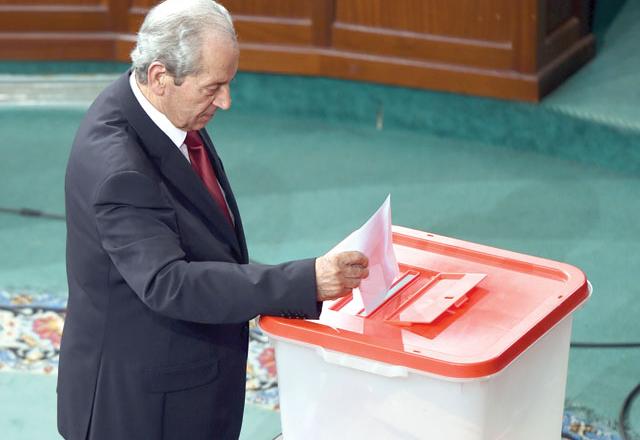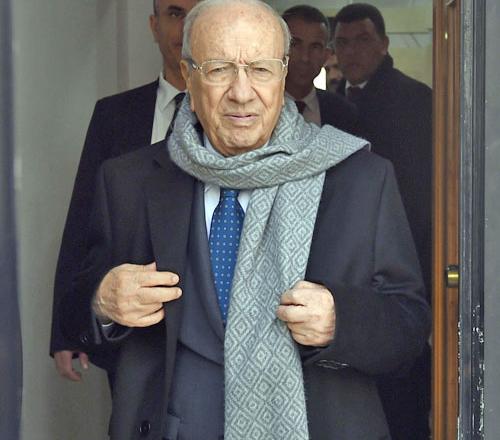You are here
Tunisia eyes autumn elections to anchor democracy
By Reuters - Jun 16,2014 - Last updated at Jun 16,2014
TUNIS — Tunisia’s election authority has proposed a parliamentary vote on October 26 and the first round of presidential polls a month later, marking the final step towards full democracy in the cradle of the 2011 Arab Spring uprisings.
Tunisia’s often turbulent political transition began after the popular revolt that ousted autocrat Zine El Abidine Ben Ali and inspired revolutions across the region.
The North African state has been run of late by a caretaker government that saw through the adoption of a new constitution lauded as a model of democratic evolution in an unstable region.
“Our proposal, which we will present to the Constituent Assembly, is to hold parliamentary elections on October 26, 2014, and the first session of the presidential vote on November 23, 2014, with the second session on December 28,” Chafik Sarsar, head of the country’s election commission, told Reuters on Monday.
It is widely expected that the Tunis parliament will in the coming days approve the dates after politicians patched up disputes over conditions for the election last week.
Setting a date for elections could restore investor confidence in the Tunisian economy, which has unravelled amid bouts of political turmoil and government mismanagement. The budget deficit is expected to touch 8 per cent by the end of 2014, more than 50 per cent higher than under Ben Ali.
Tunisia’s two major challenges are tackling bloated public spending, reviving the economy where unemployment now hovers at 15 per cent, and neutralising Islamist militants whose occasional attacks have disrupted steps towards democracy since 2011.
Islamists and secularists
The moderate Islamist Ennahda Party won the first post-Ben Ali election in 2011 but ran a messy government that came under fire for perceived mishandling of the economy and lenience towards radical Islamist groups.
The assassination last year of two secular opposition leaders by suspected Islamist militants swelled a popular backlash against Ennahda, forcing it to resign and cede place to a technocratic caretaker government.
However, Ennahda is expected to be one of the strongest election contenders in October, along with the main opposition secularist party Nida Tounes.
Nida Tounes will be open to a governing coalition with Ennahda if the next elections do not produce a clear majority, party chief and former prime minister Beji Caid Essebsi told Reuters in an interview in March.
Ennahda leader Rached Ghannouchi said Tunisia would have to be governed by consensus over the next five years to anchor its fragile democracy.
With its new constitution and caretaker administration in place until elections, Tunisia’s relatively smooth progress contrasts with years of bloody upheaval in Egypt, Libya and Yemen, which also ousted long-time autocratic leaders in 2011.
Egypt’s former army chief was elected president last month in a vote that froze out credible challengers, 10 months after the military toppled freely elected Mohamed Morsi of the Muslim Brotherhood following months of violent mass unrest.
In Tunisia’s presidential election, there will be fierce competition between several likely candidates — Essebsi, current President Moncef Marzouki, Republican Party chief Nejib Chebbi and “Tayar Al Mahaba” Party leader Hachmi Hamdi.
Ennahda has not revealed its presidential candidate so far.
Elections commission chief Sarsar said last month hat the new electoral law would assure a free and fair vote, with more than 1,000 international observers invited to monitor it.
Related Articles
Tunisia’s next presidential and parliamentary elections will probably be held in the second half of November, the election agency chief said on Saturday, about polls that will mark the country’s final step towards full democracy.
Tunisia’s first parliament since the 2011 revolution on Thursday elected veteran politician Mohamed Ennaceur, 80, of anti-Islamist party Nidaa Tounes as house speaker.
Veteran anti-Islamist politician Beji Caid Essebsi was declared the winner of Tunisia's first free presidential election on Monday, capping off the transition to democracy in the birthplace of the Arab Spring.


















